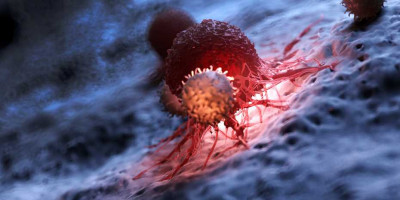
The COVID-19 pandemic and recent Nobel Prize recognition have spotlighted mRNA therapies as a promising approach for diseases like cancer.
Found in the journal Nature Communications.
With precision, scalability, and controlled immune activation, mRNA-based immunotherapy can encode proteins that stimulate the immune system to target and destroy cancer cells.
Yet, naked mRNA is unstable, prone to degradation, and poorly absorbed by cells, limiting its effectiveness.
This makes the development of reliable delivery methods essential for the future success of mRNA immunotherapies.
A trustworthy delivery tool
In the search for protecting therapeutic mRNA against degradation, the RNA technology company eTheRNA explored the possibility of encapsulating the mRNA in lipid-based nanoparticles (LNPs).
To find the best formulation of LNP to bring mRNA into cells, the company teamed up with Dr. Bruno De Geest (Ghent University) because of his expertise in developing LNPs.
The eTheRNA research team encapsulated a novel mixture of mRNA coding for three proteins (IL-21, IL-7, and 4-1BBL) in the selected LNPs.
Dr. Florence Lambolez, director Pharmacology at eTheRNA: “In our newly developed LNPs,the mRNAs encoding therapeutic proteins are protected against degradation during their intratumoural administration. This will improve the overall therapeutic efficacy.”
Unravelling the mode of action
Dr. Damya Laoui and her team at VIB-VUB then tested the efficacy of the Triplet mRNA LNPs in various preclinical tumour models.
The team found that the LNP were taken up by various cells within the tumour, including immune cells, such as dendritic cells.
These cells could then produce high levels of the therapeutic proteins in the tumour, showing synergistic effects.
Ahmed Hamouda (VIB-VUB), first author of the study: “The dendritic cells that took up the LNPs, matured and moved to the lymph nodes where they activated T cells. On their turn the T-cells eliminated the cancer cells completely. We also showed that the Triplet mRNA LNP therapy didn’t work in the absence of T cells.”
Positive findings for future therapies
The results in mouse models are very promising.
Next to an elimination - instead of an expected reduction - of the cancer cells, the Triplet LNP therapy showed reduced toxicity.
The therapy was also effective in cancer models that show resistance to immune checkpoint blockade, the currently most used immunotherapy.
As a first step from mice to men, the researchers proved in the lab that LNPs can also be taken up by human lung cancer cells.
Dr. Damya Laoui (VIB-VUB): “It is great to see that our strategy to use LNPs to administer therapeutic mRNAs into the tumour, works. It stimulates the immune system to recognise and eliminate cancer cells, while limiting detrimental side effects. On top, it leads to immunological memory that protects against tumour rechallenge.”
Dr. Stefaan De Koker, eTheRNA: “These results are a confirmation of the relevance of our immunotherapeutic platform for the development of future immunotherapies. Depending on the needs of different types of cancer, we can leverage our platform for various therapeutic mRNAs.”
Source: Vrije Universiteit Brussel
The World Cancer Declaration recognises that to make major reductions in premature deaths, innovative education and training opportunities for healthcare workers in all disciplines of cancer control need to improve significantly.
ecancer plays a critical part in improving access to education for medical professionals.
Every day we help doctors, nurses, patients and their advocates to further their knowledge and improve the quality of care. Please make a donation to support our ongoing work.
Thank you for your support.